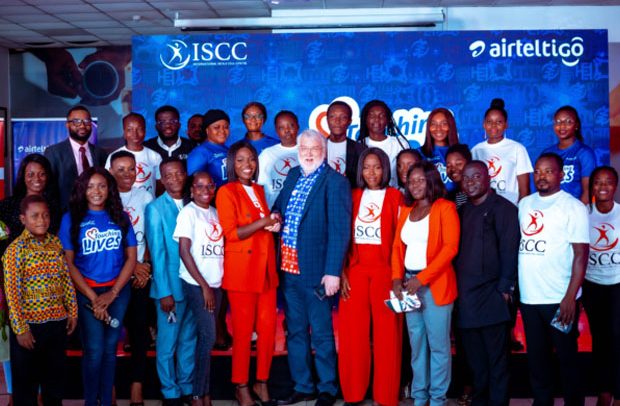Officials of AirtelTigo and ISCC pose for the cameras during the partnership launch
SICKLE CELL Disease (SCD) can take a lot of energy from affected individuals due to recurring pain and fatigue that accompany the disease. This can result in a warrior’s (person living with SCD) inability to participate in day-to-day activities, when unwell. When employers and co-workers are inadequately informed about SCD, they may not be able to offer the necessary support and accommodations for a colleague living with the condition. This often leads to stigmatisation at the workplace.
The International Sickle Cell Centre (ISCC) partnered with AirtelTigo Touching Lives to raise awareness about SCD.
In Episode 2 of the award-winning series AirtelTigo Touching Lives, we shed light on Sickle cell and the workplace. We talk about how it impacts people’s lives and the need to build supportive work environments for people living with the condition.
What is Sickle Cell Disease (SC)?
- Eugenia N.K Asare, a Specialist Hematologist at the Ghana Institute of Clinical Genetics and Senior Consultant with the ISCC stated that “SCD is an inherited blood disorder which is associated with chronic and acute problems. These problems range from acute pain episodes to chronic anemia due to the breakdown of red blood cells. But SCD in itself, is not a disability although some complications can lead to certain disabilities. As a result of the improvements in healthcare, life expectancy has dramatically improved for SCD warriors”. Dr. Asare emphasized that with adequate support, individuals living with SCD are able to perform their work responsibilities.
Working with SCD
- Dominic Dzineku, a Sickle Cell Warrior, shared his experiences at the workplace. He spoke about being given a job offer on one occasion but forgot to disclose his sickle cell status. His boss happened to be a medical doctor hence understood his situation. However, he noticed that whenever he missed work for medical reasons, an amount of money was deducted from his salary. Again, because he had a boss who was knowledgeable about the disease, she helped him rectify the issue.
- We, therefore, engaged the public in this episode, to find out if they would deduct missed work hours from the salaries of employees’ who miss work because of the condition. One person stated that he believed it was no fault of the affected employee hence would not punish the individual for something he or she could not control.
- Others were also of the opinion that it does not concern their employers in the first place so do not see the need to even disclose their sickle cell genotype to an employer. A male respondent stated that, “I wouldn’t tell my employers if I have sickle cell disease because I don’t know if they would offer any help and they also can’t cure me of the condition”.
- Dominic spoke about a time in 2016 when he woke up feeling unwell hence had to go to the hospital instead of going to work. He was admitted due to malaria and an acute pain episode from SCD. The following day, he experienced another complication of SCD hence had to be taken to theatre for an emergency surgery. He ended up spending more days than anticipated in the hospital. After his discharge from the hospital, he was given some time off work to rest and properly heal. His employer agreed to grant him the break, but this was going to be without a salary. He decided to resign because he knew the work environment was not conducive for his health.
- Mary Ansong, Founder and CEO of the ISCC, validated the fact that sometimes, people living with SCD may miss work due to acute pain episodes, hospital review or admission. She stated that having an empathetic employer who understands the condition and is willing to provide the needed support is often based on luck rather than being the norm. Some employers have denied employees with SCD, the right to go to the hospital for their reviews and others have even deducted from their salaries, lost work hours due to a hospital admission.
Support for people with SCD at the workplace
- Dominic shares that leaving his former workplace has helped him learn and develop new skills like software development, photography, and videography. It has also given him the opportunity to join organisations like ISCC to advocate for people living with SCD.
- Asare reminds us that people living with SCD can occupy different spheres of work so should not be stigmatized at the workplace because of the condition.
- Chief Human Resources Officer of AirtelTigo, Eric Adadevoh, insists that employers must be empathetic to allow SCD patients exhibit their skills and talents to their highest potential.
AirtelTigo Touching Lives is a corporate social initiative of AirtelTigo. The Sickle Cell Edition is done in partnership with the International Sickle Cell Centre (ISCC) and will feature medical experts from the ISCC, persons living with SCD, relatives, caregivers and SCD advocates.
Source: AirtelTigo


